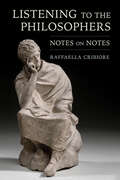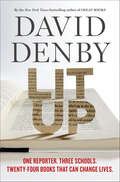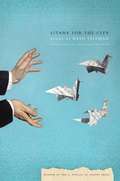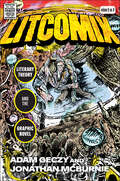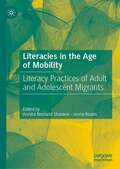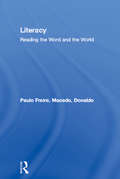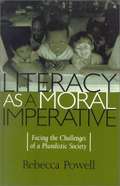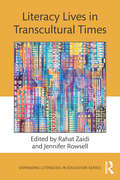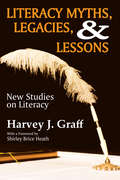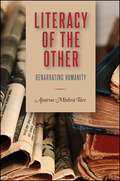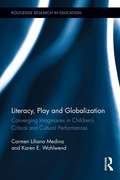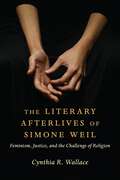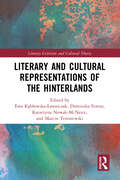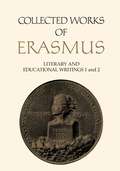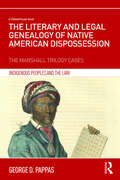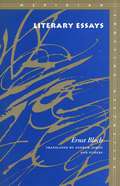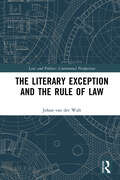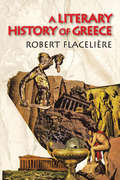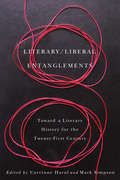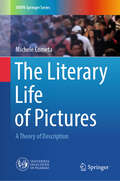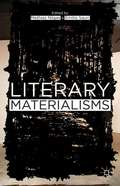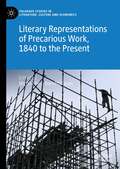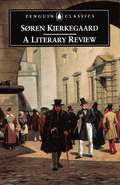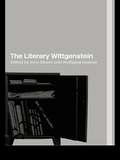- Table View
- List View
Listening to the Philosophers: Notes on Notes
by Raffaella CribioreListening to the Philosophers offers the first comprehensive look into how philosophy was taught in antiquity through a stimulating study of lectures by ancient philosophers that were recorded by their students. Raffaella Cribiore shows how the study of notes—whether Philodemus of Gadara's notes of Zeno's lectures in the first century BCE, or Arrian recording the Discourses of Epictetus in the second century CE, or the students of Didymus the Blind in the fourth century and Olympiodorus in the sixth century—can enable us to understand the methods and practices of what was an orally conducted education. By considering the pedagogical and mnemonic role of notetaking in ancient education, Listening to the Philosophers demonstrates how in antiquity the written and the spoken worlds were intimately intertwined.
Lit Up: One Reporter. Three Schools. Twenty-four Books That Can Change Lives
by David DenbyA bestselling author and distinguished critic goes back to high school to find out whether books can shape livesIt's no secret that millions of American teenagers, caught up in social media, television, movies, and games, don't read seriously-they associate sustained reading with duty or work, not with pleasure. This indifference has become a grievous loss to our standing as a great nation--and a personal loss, too, for millions of teenagers who may turn into adults with limited understanding of themselves and the world. Can teenagers be turned on to serious reading? What kind of teachers can do it, and what books? To find out, Denby sat in on a tenth-grade English class in a demanding New York public school for an entire academic year, and made frequent visits to a troubled inner-city public school in New Haven and to a respected public school in Westchester county. He read all the stories, poems, plays, and novels that the kids were reading, and creates an impassioned portrait of charismatic teachers at work, classroom dramas large and small, and fresh and inspiring encounters with the books themselves, including The Scarlet Letter, Brave New World, 1984, Slaughterhouse-Five, Notes From Underground, Long Way Gone and many more. Lit Up is a dramatic narrative that traces awkward and baffled beginnings but also exciting breakthroughs and the emergence of pleasure in reading. In a sea of bad news about education and the fate of the book, Denby reaffirms the power of great teachers and the importance and inspiration of great books.
Litany for the City
by Ryan TeitmanSelected by Jane Hirshfield from over six hundred manuscripts, Litany for the City is the winner of the tenth annual A. Poulin, Jr. Poetry Prize. Of Litany for the City, Hirshfield writes, "This book carries both startling imaginative freedoms and the impulsion of a person navigating the terrain of his life by means of the star-chart and sextant of poems--a winning combination, for me."Ryan Teitman is a Wallace Stegner Fellow in Poetry at Stanford University. He holds an MA and MFA from Indiana University. He currently lives in Berkeley, California.
Litany for the City
by Ryan Teitman Jane HirshfieldSelected by Jane Hirshfield from over six hundred manuscripts, Litany for the City is the winner of the tenth annual A. Poulin, Jr. Poetry Prize. Of Litany for the City, Hirshfield writes, "This book carries both startling imaginative freedoms and the impulsion of a person navigating the terrain of his life by means of the star-chart and sextant of poems--a winning combination, for me."Ryan Teitman is a Wallace Stegner Fellow in Poetry at Stanford University. He holds an MA and MFA from Indiana University. He currently lives in Berkeley, California.
Litcomix: Literary Theory and the Graphic Novel
by Adam Geczy Jonathan McBurnieCritical studies of the graphic novel have often employed methodologies taken from film theory and art criticism. Yet, as graphic novels from Maus to Watchmen have entered the literary canon, perhaps the time has come to develop theories for interpreting and evaluating graphic novels that are drawn from classic models of literary theory and criticism. Using the methodology of Georg Lukács and his detailed defense of literary realism as a socially embedded practice, Litcomix tackles difficult questions about reading graphic novels as literature. What critical standards should we use to measure the quality of a graphic novel? How does the genre contribute to our understanding of ourselves and the world? What qualities distinguish it from other forms of literature? LitComix hones its theoretical approach through case studies taken from across the diverse world of comics, from Yoshihiro Tatsumi’s groundbreaking manga to the Hernandez Brothers’ influential alt-comix. Whether looking at graphic novel adaptations of Proust or considering how Jack Kirby’s use of intertextuality makes him the Balzac of comics, this study offers fresh perspectives on how we might appreciate graphic novels as literature.
Literacies in the Age of Mobility: Literacy Practices of Adult and Adolescent Migrants
by Annika Norlund Shaswar Jenny RosénThis book offers insights into questions related to mobility, literacy learning and literacy practices of adult and adolescent migrants. The authors address learning and use of literacies among adults and adolescents in both temporary and more permanent post-migration settlements and in various contexts, exploring spatial as well as temporal dimensions of literacies and power. The formal and informal educational settings examined include state-mandated schools, community settings, and libraries, and the chapters offer insights into the complex relations between literacies and mobility, as well as a range of perspectives on language use and language learning. This volume will be of interest to students and researchers in fields including education and literacy, applied linguistics, language education and migration studies.
Literacy: Reading the Word and the World (Critical Studies In Educationcritical Studies In Education)
by Paulo Freire Donaldo MacedoFreire and Macedo analyse the connection between literacy and politics according to whether it produces existing social relations, or introduces a new set of cultural practices that promote democratic and emancipatory change.
Literacy as a Moral Imperative: Facing the Challenges of a Pluralistic Society
by Rebecca PowellPowell argues that literacy instruction should encourage social responsibility and civic action and should nurture a culture of compassion and care.
Literacy Lives in Transcultural Times (Expanding Literacies in Education)
by Jennifer Rowsell Rahat ZaidiCombining language research with digital, multimodal, and critical literacy, this book uniquely positions issues of transcultural spaces and cosmopolitan identities across an array of contexts. Studies of everyday diasporic practices across places, spaces, and people’s stories provide authentic pictures of people living in and with diversity. Its distinctive contribution is a framework to relate observation and analysis of these flows to language development, communication, and meaning making. Each chapter invites readers to reflect on the dynamism and complexity of spaces and contexts in an age of increasing mobility, political upheaval, economic instabilities, and online/offline landscapes.
Literacy Myths, Legacies, and Lessons: New Studies on Literacy
by Harvey J. Graff Shirley Brice HeachIn his latest writings on the history of literacy and its importance for present understanding and future rethinking, historian Harvey J. Graff continues his critical revisions of many commonly held ideas about literacy. The book speaks to central concerns about the place of literacy in modern and late-modern culture and society, and its complicated historical foundations.Drawing on other aspects of his research, Graff places the chapters that follow in the context of current thinking and major concerns about literacy, and the development of both historical and interdisciplinary studies. Special emphasis falls upon the usefulness of "the literacy myth" as an important subject for interdisciplinary study and understanding. Critical stock-taking of the field includes reflections on Graff's own research and writings of the last three decades, and the relationships that connect interdisciplinary rethinking and the literacy myth.The collection is noteworthy for its attention to Graff's reflections on his identification of "the literacy myth" and in developing LiteracyStudies@OSU (Ohio State University) as a model for university-wide interdisciplinary programs. It also deals with ordinary concerns about literacy, or illiteracy, that are shared by academics and concerned citizens. These nontechnical essays will speak to both academic and nonacademic audiences across disciplines and cultural orientations.
Literacy of the Other: Renarrating Humanity (SUNY series, Transforming Subjects: Psychoanalysis, Culture, and Studies in Education)
by Aparna Mishra TarcWinner of the 2017 American Educational Research Association's Division B Outstanding Book AwardLiterary of the Other stages a bold psychoanalytic investigation into the existential significance of literacy. Featuring a dazzling array of novel artifacts and events, the book situates literacy in the internal fictive worlds of the self and other. This approach is designed to encourage teachers of language and literature to sustain reflexive thought in their practices of reading and writing as a means to gain insight into the psychical processes of literacy. With lucid and compelling prose, Aparna Mishra Tarc reminds us of the importance of fostering a meaningful practice of literacy in the construction of real and fictive stories by which to live well throughout our lives. Renarrating many versions of a shared humanity might develop in us all a sympathetic regard for the storied lives of others.
Literacy, Play and Globalization: Converging Imaginaries in Children's Critical and Cultural Performances (Routledge Research in Education #115)
by Carmen L. Medina Karen E. WohlwendThis book takes on current perspectives on children’s relationships to literacy, media, childhood, markets and transtionalism in converging global worlds. It introduces the idea of multi-sited imaginaries to explain how children’s media and literacy performances shape and are shaped by shared visions of communities that we collectively imagine, including play, media, gender, family, school, or cultural worlds. It draws upon elements of ethnographies of globalization, nexus analysis and performance theories to examine the convergences of such imaginaries across multiple sites: early childhood and elementary classrooms and communities in Puerto Rico and the Midwest United States. In this work we attempt to understand that the local moment of engagement within play, dramatic experiences, and literacies is not a given but is always emerging from and within the multiple localities children navigate and the histories, possibilities and challenges they bring to the creative moment.
The Literary Afterlives of Simone Weil: Feminism, Justice, and the Challenge of Religion (Gender, Theory, and Religion)
by Cynthia R. WallaceThe French philosopher-mystic-activist Simone Weil (1909–1943) has drawn both passionate admiration and scornful dismissal since her early death and the posthumous publication of her writings. She has also provoked an extraordinary range of literary writing focused on not only her ideas but also her person: novels, nonfiction, and especially poetry. Given the challenges of Weil’s ethic of self-emptying attention, what accounts for her appeal, especially among women writers?This book tells the story of some of Weil’s most dedicated—and at points surprising—literary conversation partners, exploring why writers with varied political and religious commitments have found her thought and life so resonant. Cynthia R. Wallace considers authors who have devoted decades of attention to Weil, such as Adrienne Rich, Annie Dillard, and Mary Gordon, and who have written poetic sequences or book-length verse biographies of Weil, including Maggie Helwig, Stephanie Strickland, Kate Daniels, Sarah Klassen, Anne Carson, and Lorri Neilsen Glenn. She illuminates how writing to, of, and in the tradition of Weil has helped these writers grapple with the linked harms and possibilities of religious belief, self-giving attention, and the kind of moral seriousness required by the ethical and political crises of late modernity. The first book to trace Weil’s influence on Anglophone literature, The Literary Afterlives of Simone Weil provides new ways to understand Weil’s legacy and why her provocative wisdom continues to challenge and inspire writers and readers.
Literary and Cultural Representations of the Hinterlands (Literary Criticism and Cultural Theory)
by Ewa Kębłowska-Ławniczak Dominika Ferens Katarzyna Nowak-McNeice Marcin TereszewskiThis interdisciplinary collection explores the diverse relationships between the frequently ignored and inherently ambiguous hinterlands and their manifestations in literature and culture. Moving away from perspectives that emphasize the marginality of hinterlands and present them as devoid of agency and “cultural currency”, this collection assembles a series of original essays using various modes of engagement to reconceptualize hinterlands and highlight their semiotic complexity. Apart from providing a reassessment of hinterlands in terms of their geocultural significance, this book also explores hinterlands through such concepts as nostalgia, heterotopia, identity formation, habitation, and cognitive mapping, with reference to a wide geographical field. Literary and filmic revisions of familiar hinterlands, such as the Australian outback, Alberta prairie, and Arizona desert, are juxtaposed in this volume with representations of such little-known European hinterlands as Lower Silesia and Ukraine, and the complicated political dimension of First World War internment camps is investigated with regard to Kapuskasing (Ontario). Rural China and the Sussex Downs are examined here as writers’ retreats. Inner-city hinterlands in Haiti, India, Morocco, and urban New Jersey take on new meaning when contrasted with the vast hinterlands of megacities like Johannesburg and Los Angeles. The spectrum of diverse approaches to hinterlands helps to reinforce their multilayered and multivocal nature as spaces that defy clear categorization.
Literary and Educational Writings, 1 and 2: Volume 1: Antibarbari / Parabolae. Volume 2: De copia / De ratione studii (Collected Works of Erasmus #23-24)
by Desiderius Erasmus Craig ThompsonThese volumes are the first in a series containing works by Erasmus 'that concern literature and education': interests which to him were scarcely separable. The aim of Erasmian education was a civilized life, expressed in Christian piety and the fulfilment of public and private duties and embellished by learning and literature. Towards these ends the soundest training for youth was what Erasmus often called bonne litterae, 'good letters,' a literary and rhetorical training based on Greek and Latin authors. For centuries the classical curriculum was the core of liberal education, and Erasmus was long regarded as its exemplar. Though never a university teacher except briefly at Cambridge (1311-14), he was a 'teacher of teachers' through his treatises on pedagogy and rhetoric and his many works of scholarship. The four works presented here in annotated translations are characteristic expressions of his dedication to learning and his confidence in the values of classical literature for the modern world of his time. Antibarbari (1520), translated and annotated by Margaret Mann Phillips, is a defence of the humanities against ignorant and misguided critics who question both their supposed worth and the appropriateness of pagan writings for Christian pupils. The reply of Erasmus becomes a manifesto on behalf of reason, scholarship, and literature. As for paganism, he insists that if secular knowledge is used properly it cannot harm but must help Christians. 'None of the liberal disciplines is Christian' because they all antedated Christianity, yet they 'all concern Christ' because they can be put to Christian uses. Parabolae (1514), translated and annotated by R.A.B. Mynors, a work that 'contributes eminently to style,' is a collection of similitudes drawn from observations of men, customs, and nature. Many are culled from Plutarch and Seneca, but for those from Seneca, and from Aristotle, the moral applications are added by Erasmus. As an exercise in the rhetoric of moral philosophy - 'many jewels in one small box,' Erasmus terms it-this book quickly became popular and long remained so. De copia (1512), translated and annotated by Betty I. Knott, is not a plan for the entire curriculum but a treatise on the 'abundant' or rich style in writing and speaking Latin, a guide to attaining fluency and variety in discourse. As a manual for students De copia broke new ground. It was a remarkably successful work, used in schools in many lands for generations. From 1312 to 1600, more than 130 printings are recorded. De ratione studii (1312), translated and annotated by Brian McGregor, furnishes a concise but clear exposition of the curriculum, text, and methods of Erasmus' programme for liberal studies in grammar schools. Here as in all of his writings on education, language is the heart of the matter. The main goals are accurate, effective expression and communication in Latin, though Erasmus expects much besides literature to be learned from the study of literature. He emphasizes the necessity for competent and sympathetic teachers. Each translation is introduced by the translator, and a general introduction by the editor discusses the significance of each of the works, its relation to the others, and its subsequent fortunes. Wallace K. Ferguson provides an introductory essay, 'The Works of Erasmus.' Volumes 23 and 24 of the Collected Works of Erasmus series – Two-volume set.
The Literary and Legal Genealogy of Native American Dispossession: The Marshall Trilogy Cases (Indigenous Peoples and the Law)
by George D PappasThe Literary and Legal Genealogy of Native American Dispossession offers a unique interpretation of how literary and public discourses influenced three U.S. Supreme Court Rulings written by Chief Justice John Marshall with respect to Native Americans. These cases, Johnson v. M’Intosh (1823), Cherokee Nation v. Georgia (1831) and Worcester v. Georgia (1832), collectively known as the Marshall Trilogy, have formed the legal basis for the dispossession of indigenous populations throughout the Commonwealth. The Trilogy cases are usually approached as ‘pure’ legal judgments. This book maintains, however, that it was the literary and public discourses from the early sixteenth through to the early nineteenth centuries that established a discursive tradition which, in part, transformed the American Indians from owners to ‘mere occupants’ of their land. Exploring the literary genesis of Marshall’s judgments, George Pappas draws on the work of Michel Foucault, Edward Said and Homi Bhabha, to analyse how these formative U.S. Supreme Court rulings blurred the distinction between literature and law.
Literary Essays (Meridian: Crossing Aesthetics Series)
by Ernst BlochThe writings of Ernst Bloch represent one of the lasting linguistic and intellectual achievements of German expressionism. In them one finds a pathos and urgency, a spirit of breaking away and a projection toward a new way of seeing, thinking, and living together that has its origins in the artistic and intellectual unrest of this century's second decade. <P><P> Bloch's literary essays are not, strictly speaking, "theoretical" pieces, certainly not applications to literature of some pre-existing conceptual apparatus. Collectively they represent a field of experiment in which a thinker of astonishing originality exposes his thought to the provocation of literary, musical, and artistic works, but also to such phenomena as advertisements, landscapes, clichés and obsessive images, films, and forms of interaction in country and city. What is the function of musical accompaniment in a silent film? How does a writer's birthplace imprint itself on his intellect? What is the philosophical import of the detective novel? Why is anxiety more acute when its stimulus is aural rather than visual? What is the relation between modern art and the machinery of factory production? Such are the questions encountered here. Seldom is writing less automatic, willing to take more risks, and, quite simply, so fresh and refreshingly new. <P><P> The pieces gathered here, which date from 1913 to 1964, are held together by Bloch's view of the human as being always beyond itself, as anticipating itself and never positively there. This thrust beyond the horizon of positivity expresses itself in wishes, hopes, fantasies, dreams, imaginative creations, and utopian projects. Bloch s attention is always, and in the most diverse gestures, works, and productions, alert to the energies of political transcendence.
The Literary Exception and the Rule of Law (Law and Politics)
by Johan Van Der WaltAddressing the influential analysis of law and literature, this book offers a new perspective on their relationship. The law and literature movement that has gained global prominence in the course of last decades of the twentieth and the first decades of the twenty-first centuries has provided the research and teaching of law with a considerable body of new and valuable knowledge and understanding. Most of the knowledge and insights generated by the movement concern either a thematic overlap between legal and literary discourses – suggesting they deal with the same moral concerns – or a rhetorical, semiotic or general linguistic comparability or ‘sameness’ between them – imputing to both the same or very similar narrative structures. The Literary Exception and the Rule of Law recognises the wealth of knowledge generated by this approach to the relationship between law and literature, and acknowledges its debt to this genre of scholarship. It nevertheless also proposes, on the basis of a number of revealing phenomenological inquiries, a different approach to law and literary studies: one that emphasises the irreducible difference between law and literature. It does so with the firm believe that a regard for the very different and indeed opposite discursive trajectories of legal and literary language allows for a more profound understanding of the unique and indeed separate roles that the discourses of law and literature generally play in the sustenance of relatively stable legal cultures. This important rethinking of the relationship between law and literature will appeal to scholars and students of legal theory, jurisprudence, philosophy, politics and literary theory.
A Literary History of Greece
by Robert FlaceliereThere are several good histories of Greek literature of various shapes and sizes, but the purpose of this book is not simply to consider the literature of ancient Greece as an isolated subject, treating each of the literary modes - epic, lyric, drama, history, philosophy, and rhetoric - in terms of its own evolution. Instead, Robert Flaceliere provides a Greek history that deals with all the important works of Hellenic literature that are still of interest to contemporary readers; and he does this in chronological order with an accurate account of their historical background.Flaceliere follows the history of Greece down through the centuries as the writer records it. He describes the political atmosphere in the nation and the advances in the other arts that influenced literature. The author understands Sappho's rhapsodies; girlish love in the context of the acceptance of homosexuality in that era. He sympathizes with the unrequited passion of the penniless Archilochos. He appreciates Pindar's pacifist tendencies, Herodotus' upright insistence on truth, and Euripides' doubts about the existence of the gods. For the classical centuries, so rich in talent and genius, the author follows the successive generations systematically so as to distinguish the special features of each, what it owes to the preceding generation and how it paves the way for the next.Since this is a literary history, attention is mainly focused on the writers and their works, but by displaying these in their political, social, artistic and scientific setting, Flaceliere gives a better understanding of the production and significance of these wonderful achievements of the human spirit. Due to the wide range of material presented, "A Literary History of Greece" can be used as a reference book as well as for enjoyment reading.
Literary / Liberal Entanglements: Toward a Literary History for the Twenty-First Century
by Corrinne Harol Mark SimpsonIn Literary/Liberal Entanglements, Corrinne Harol and Mark Simpson bring together ten essays by scholars from a wide range of fields in English studies in order to interrogate the complex, entangled relationship between the history of literature and the history of liberalism. The volume has three goals: to investigate important episodes in the entanglement of literary history and liberalism; to analyze the impact of this entanglement on the secular and democratic projects of modernity; and thereby to reassess the dynamics of our neoliberal present. The volume is organized into a series of paired essays, with each pair investigating a concept central to both literature and liberalism: acting, socializing, discriminating, recounting, and culturing. Collectively, the essays demonstrate the vivid capacity of literary study writ large to reckon with, imagine, and materialize durative accounts of history and politics. Literary/Liberal Entanglements models a method of literary history for the twenty-first century.
The Literary Life of Pictures: A Theory of Description (UNIPA Springer Series)
by Michele CometaThis book offers a theory of ekphrasis—the literary description of an artwork—from the perspective of Visual Culture studies. A theory of ekphrasis must take into account not only the rhetorical strategies articulated in the description of artworks, but also the complex interplay that holds together the pictures that are described, the gazes that rest on them, and the dispositives that mediate them. It is therefore a matter of linking the study of the verbal rhetoric with the dynamics that are established between the author, the reader, and the visual artworks, real or fictive, as well as the performative aspects of description and the mediascapes that, from time to time, condition the gaze and the visual experience of the authors and the readers. This book proposes thus to consider both the intradiegetic aspects of description and the extradiegetic ones that condition its verbal texture. Following the rhetorics of ekphrasis throughout the Western tradition, from its origins in Philostratus, its reappraisal by Johann Joachim Winckelmann, to the twentieth-century avant-garde, this book shows how ekphrastic techniques are historically determined by the relationship between pictures, gazes, and dispositives.
Literary Materialisms
by Mathias Nilges Emilio SauriHow do we today define literary studies as an academic discipline and literature as a relevant, discrete object of study? Beyond arguments that insist upon the continued importance of literature only via its subsumption under the broad category of culture on the one hand and nostalgic, traditionalist oppositions to materialist study of literature aimed to safeguard the autonomy of literature from the social, the economic, and the political on the other, Literary Materialisms gathers thirteen essays by established and emerging scholars that trace the medially and disciplinarily specific future of literary studies in an updated and newly historicized attention to materialism.
Literary Representations of Precarious Work, 1840 to the Present (Palgrave Studies in Literature, Culture and Economics)
by Michiel Rys Bart PhilipsenLiterary Representations of Precarious Work, 1840 to the Present sheds new light on literary representations of precarious labor from 1840 until the present. With contributions by experts in American, British, French, German and Swedish culture, this book examines how literature has shaped the understanding of socio-economic precarity, a concept that is mostly used to describe living and working conditions in our contemporary neoliberal and platform economy. This volume shows that authors tried to develop new poetic tools and literary techniques to translate the experience of social regression and insecurity to readers. While some authors critically engage with normative models of work by zooming in on the physical and affective backlash of being a precarious worker, others even find inspiration in their own situations as writers trying to survive. Furthermore, this volume shows that precarity is not an exclusively contemporary phenomenon and that literature has always been a central medium to (critically) register forms of social insecurity. By retrieving parts of that archive, this volume paves the way to a historically nuanced view on contemporary regimes of precarious work.
A Literary Review
by Soren KierkegaardWhile ostensibly commenting on the work of a contemporary novelist, Kierkegaard used this review as a critique of his society and age. The influence of this short piece has been far-reaching. The apocalyptic final sections are the source for central notions in Heidegger's Being and Time. Later readers have seized on the essay as a prophetic analysis of our own time. Its concepts have been drawn into current debates on identity, addiction, and social conformity.
The Literary Wittgenstein
by John Gibson Wolfgang HuemerThe Literary Wittgenstein is a stellar collection of articles relating the philosophy of Ludwig Wittgenstein (1889-1951) to core problems in the theory and philosophy of literature. Amid growing recognition that Wittgenstein's philosophy has important implications for literary studies, this book brings together twenty-one articles by the most prominent figures in the field. Eighteen of the articles are published here for the first time.The Literary Wittgenstein applies the approach of Wittgenstein to core areas of literary theory, including poetry, deconstruction, the ethical value of literature, and the nature and logic of fictional discourse. The literary dimension of Wittgenstein's own writings is also explored, such as the authorial strategy of the Tractatus, and writing and method in the Philosophical Investigations. Major literary figures discussed in the book include William Faulkner, Joseph Conrad, and Friedrich Hölderlin.By mapping out the foundations of a new approach to literature, The Literary Wittgenstein is essential reading for anyone interested in the relevance and application of Wittgenstein's thought to literary theory, aesthetics, and the philosophy of language and logic.
